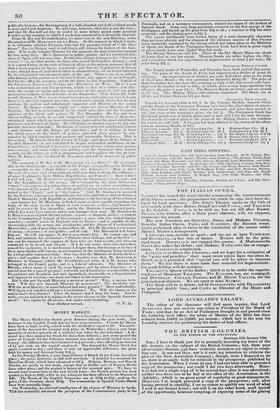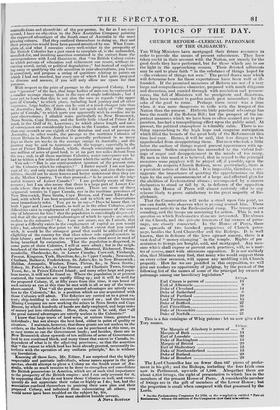THE BRITISH COLONIES.
TO THE EDITOR OF THE SPECTATOR.
astings,13th January 1834.
Sta—I have to thank you for so promptly inserting my letter of the 6th instant, en the subject of the British Colonies ; but, from your observations thereon, you have evidently mistaken my object in troub- ling you. It was not then, nor is it now, my intention to criticize the plan of the New Australian Company; though, were I disposed to do so, there is an ample field for criticism in the prospectus published by the Association. When I wrote to you, I had not been able to procures copy of the prospectus ; nor could I for two days afterwards. RIDG- WAY had not a single copy of it for several days after it was advertised; neither was there one to be had at the office of the Association, in the .Adelphi ; which is no great proof of regularity or good management. However, I at length procured a copy of the prospectus; and, after having perused it carefully, I see no reason to qualify one word of what I said in my former letter ; nor will I, on the other hand, avail myself of the opportunity, however tempting, of exposing some of the glaring
contradictions and absurdiiiei of the pro=pectus. So far as I am con- cerned, I have no objection to the New Australian Company painting the supposed advantages of the South coast of Australia in the most
glowing colours. Had they confined themselves to doing so, they and their prospectus would have been passed unnoticed by me. What I com- plain of, and what I conceive every well-wisher to the prosperity of the British Colonies has a just cause to complain of, is the unfounded, uncalled-for, and insulting assertion contained in the extract from the correspondence with Lord GODERICII, that "no British Colony exists to which persoas of education and refinement can resort, without in- curring moral, social, or political degradation ;" but instead of expluin- ing away or qualifying the vile assertion in your observations, you lave it unnoticed, and propose a string of questions relating to points on lvItich I had not touched, but every one of which I feel quite prepared -to discuss and answer, if you will only allow me space for that purpose.
With respect to the price of passage to the proposed Colony, I am
not " ignorant" of the fact, that large bodies of men can be conveyed at .A smaller average charge than in the ease of single individuals ; but I 'nave yet to learn that this is not also the case as regards " the upper part of Canada," to which place, including land journey and all other expenses, large bodies of men can be sent at a much cheaper rate than
to Australia; but, Mr. Editor, I did not speak solely of "the tipper !parts of Canada," to which parts you apparently wish to confine mein your observations ; I alluded more particularly to New Brunswick, :Nova Scotia, Cape Breton, and the fertile little island of Prince Ed- ward, in the Gulf of St. Lawrence; to which places length and rates of conveyance are considerably less than to the Canadas, and not more than one seventh or one eighth of the duration and cost of passage to Australia ; in other words, the passage to the maritime Colonies of treat Britain in North America is generally performed in as many days as there are weeks in the average voyage to Australia and the Journey may be said to terminate with the voyage; especially in the case of Prince Edward Island, which, though containing upwards of one million of acres of good land, is at no part ten miles distant from the sea; and, in all these maritime Colonies, water conveyance can be had to within a few miles of any location which the settler may select. You ask—" But is our correspondent ignorant of the present state
of the Colonies which he eulogizes?" I natter myself I am not igno- rant of it ; and only regret that their present state, and also their capa- bilities, should not be more known and better understood than they are in the Mother Country. You then proceed—" Is he aware of the seig- norial tenures of Lower Canada?" I am perfectly aware of those tenures ; but I am also aware that there is a large part of Lower Ca- alada where they do not at this time exist. There are none of those -seignoriul tenures in Upper Canada, nor in the maritime provinces of New Bruaswick, Nova Scotia, Cape Breton, and Prince Edward Is- land, with which I am best acquainted, and to which my observations most immediately refer. You go to to say—" Does he know that, in both Upper and Lower Canada. as well as in the other Colonies, great 'difficulties exist in employment of capital, in consequence of the sear- city of labourers for hire ? that the population is exceedingly dispetaed ? and that all the great natural advantages of which he speaks are utterly useless to the colonists ? " &e. I am not aware, nor do I admit, that so great a difficulty exists in the employment of capital as you would infer ; but, admitting that point to the fullest extent that you could wish, it would be the strongest proof that could be adduced of the eligibility of the country for that class whose sole capital consists in their labour ; and those are the very persons who stand most in need of being benefited by emigration. That the population is dispersed, in some parts of those Colonies, I will at once admit ; but in the neigh- bourhood of the towns,—such as Quebec, Montreal, Richmond, Drum- mondville, Sherbrooke, &c. in Lower Canada; Cornwall, F'itzburgh, Prescot, Kingston, York, Hamilton, &e., in Upper Canada' Newcastle, Chatham, Bathurst, Frederickton, St John's, &c. in New Brunswick ; Halifax, Annapolis, Windsor, Truro, Picton, &c., in Nova Scotia ; Sidney, St. Peter's, &c., in Cape Breton ; and Charlotte Town, George Town, &c., in Prince:Edvvard Island ; -and many other large and popu- lous towns' it will not be found so. Where the population is at present scattered, the vacancies are rapidly filling up ; and it will be well for the proposed Colony, if, at fifty years from this time, it can boast of such society as can at this time be met with in all or any of the towns above-named. That "all the great natural advantages are utterly use- less to the Colonists," &c. is a position which no one acquainted with those Colonies will admit. The fisheries are carried on to a great ex- tent; ship-building is also extensively carried on ; and the General Mining Company are now working the mines in Nova Scotia and Cape Breton, by which hundreds of hands are daily employed, and large sums of money put into circulation. How, then, can it be said, that "all the great natural advantages are utterly useless to the Colonists?"
I know that large tracts of land were, at various times, granted to
individuals ; but not always the best land, either in point of quality or situation. I maintain, however, that those grants are not useless to the settlers, as the lands included in them can be purchased at this time, on as easy terms as can the Government lands ; and besides, there are in New Brunswick alone upwards of ten millions of acres of Government land in one continued block, and many times that extent in Canada, in- dependent of what is in the adjoining provinces; so that the assertion that "the extent to which land has been already granted, necessarily in. terferes with the operation of any uniform principle," &e. is without any foundation.
Knowing all these facts, Mr. Editor, I am surprised that the highly respectable and patriotic individuals, whose names appear in the pro- spectus, should attempt to plant a Colony on the South coast of Au- stralia, while so much remains to be done to strengthen and consolidate the British possessions in America, which are of such vital importance to the prosperity of the British empire : and I can only account for it, by supposing that they do not know those Colonies so well, and conse- quently do not appreciate their value so highly as I do; but, had the association confined themselves to praising their own plan and their Proposed Colony, and refrained from calumniating all others, you would never have been troubled on the subject by, Sir, Your most obedient humble servant,
A Nova, SCOTIAN















 Previous page
Previous page